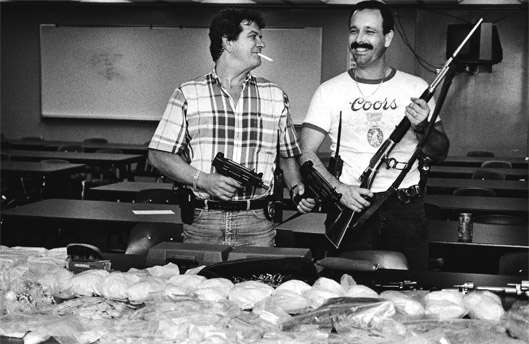Cocaine Cowboys
Cocaine Cowboys is a film that documents drug trafficking from Colombia through Cuba and into the United States. There are first-hand accounts of a heartless and cruel drug boss named Griselda Blanco killing anyone that stood in her way, to include innocent children and stories of drug runners using high tech communications equipment to monitor coast guard and ICE radio bands. The film begins with the transition with the marijuana trade in the 60’s and 70’s and transitions quickly to the cocaine trade of the 1980’s and how it effectually made Miami the city that it is today, a city of extravagance based on millions upon millions of dollars made through the sale of illicit drugs. The strategy behind the trade was quite brilliant, using Americans to transport the drugs across the border and arrange a drop to exchange drugs for money, never having either in the same place, and then the drugs went to the Colombians for sale on the streets of Miami and onward from there.
The focal point of the movie starts with the Dadeland Massacre of 1979 in Miami where Griselda Blanco ordered the hits of several men in a liquor store. This was the spark that ignited the powder keg known as the “Cocaine Wars”, basically a living hell on the streets of Miami. However the cocaine trafficking was not a new trade for the citizens of Cuba, who served as the intermediaries from Colombia. According to the Gootenberg article, “Havana was among the first post-war global sin capitals, with roots in Prohibition, where offshore gangsters rubbed shoulders with their “Latin” counterparts from Chile, Panama, Argentina, and Mexico, amid the haven of corrupted regimes of Prio, Grau, and Batista.”(150) This is the culture that permeated Miami during the Cocaine Wars and caused the bloodshed which, according to the movie, was upwards of 600 murders a year during the peak of the hellacious violence.
However, one of the most interesting points of the entire film is the socioeconomic impact that the Cocaine trafficking had on Miami, its grandiosity would never had been possible had it not been for the men and women putting their drug money towards politics and local infrastructure, while the local and federal government had to realize what was going on, they simply turned a blind eye to it, despite the incontrovertible evidence such as the Miami Federal Reserve bringing in more money than every other Federal Reserve combined. If it helps make the town a better place, I suppose that is justification for all of the lives lost. Many agree that despite the economic benefits after the cocaine wars, they still would rather it not have happened and Miami made its own name on the business of tourism instead of being a modern day “Paradise Lost” as Time magazine so succinctly put it in their exposing article in the 1980’s that defamed the city for the overt narcotics industry.

